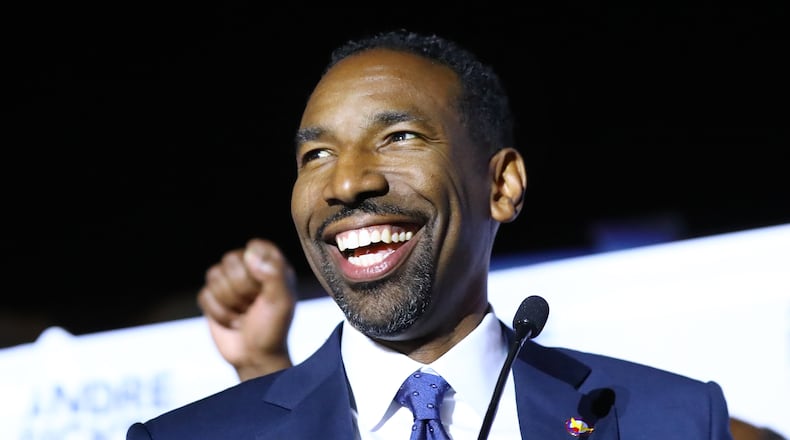Andre Dickens won’t have much time for a victory lap after winning the Atlanta mayoral runoff. Almost as soon as he takes office in January, state lawmakers are expected to take up the Republican-led effort to split the city in pieces.
The veteran councilman has much on his plate. But no task might be as daunting as resetting the city’s thorny relationship with Gov. Brian Kemp and state leaders to block legislation that could carve Buckhead into its own municipality.
While his opponent, City Council President Felicia Moore, positioned herself as a wizened deal-maker with close ties to Republican power brokers, Dickens wasn’t shy about admitting he didn’t have a long history with some of the most influential figures under the Gold Dome.
An intense campaign isn’t the best setting to build a new foundation, but Dickens emphasized his ongoing dialogue with state House Speaker David Ralston and other GOP leaders. He penned a Thanksgiving Day note to state legislators promising to “keep the capital city whole” by addressing Buckhead’s concerns.
“My S.A.F.E. Streets plan will hire 400 new police officers to get violent crime under control while addressing the root causes of crime,” he wrote, adding: “I’ll work with Buckhead leaders to address other issues including taxation, service delivery and resource allocation.”
Some Republicans whispered that Moore was the best candidate to stave off Buckhead cityhood because of her constituency. She captured north Atlanta precincts, and polls showed she was more popular than her opponent among white Republicans who fueled the demand for the city’s divorce.
Credit: Jenni Girtman
Credit: Jenni Girtman
But Dickens has sounded confident that a fresh start — and some tough love — could help thaw the icy relations.
“We need to work together with the other side when possible,” he said, “but not be afraid to oppose them on things like voter suppression and interfering with local control — whether it’s the city’s approach to COVID-19 or the takeover of Hartsfield-Jackson Airport and the county election board.”
City vs. state
It’s hard to imagine the relationship getting much worse. Kemp has pummeled outgoing Atlanta Mayor Keisha Lance Bottoms as a do-nothing Democrat who has let crime get out of hand. Bottoms has called Kemp’s pandemic response “reckless” and deadly.
They’ve locked horns in court over the city’s mask mandate. They’ve bickered over the state’s deployment of the Georgia National Guard on Atlanta’s streets. And they’ve battled over the spike in metro Atlanta crime.
Kemp seemed to employ an age-old political tactic in Georgia that governors from both parties have embraced over the past century: Feuding with Atlanta helped energize their base. And Bottoms, a top surrogate for President Joe Biden, capitalized on the same maxim to rally Democrats.
But they needn’t look far for an example of how to restore the sheen. The past decade saw an era of cooperation between then-Gov. Nathan Deal and Bottoms’ predecessor, Kasim Reed, that was the toast of the city’s corporate community.
Incoming chief executives credited the coziness with decisions to invest in Atlanta. The two leaders also put on a united, bipartisan front in lobbying to deepen Savannah’s port, jockeying for federal funding for regional projects and improving lackluster response to severe weather crises.
Credit: Handout
Credit: Handout
And it’s hard to imagine pulling off complicated deals such as the $1.6 billion Mercedes-Benz Stadium or the opening of the new Norfolk Southern headquarters without the tight bonds between City Hall and the Gold Dome, two buildings about 300 steps apart that now seem miles away.
Reed promised he could stave off a Buckhead City by renewing that spirit of cooperation, but his campaign for a third term collapsed with a third-place finish earlier this month.
Many of Dickens’ supporters indicated they saw the councilman as a more effective advocate to keep the city intact.
“This is a really critical election,” said James Marlow, 61. “I care deeply about a city that works for everybody.”
Buck Evans, 33, called the Buckhead split a “partisan, harebrained idea with no solid basis in fact.”
“It’s the type of populism that’s going to be the death of the state,” Evans said, adding: “We’re not the true phoenix city unless we revive and cast off the issues of our past.”
After Dickens’ victory, Buckhead City advocates declared their effort to split from Atlanta was only invigorated by the outcome.
“Voter turnout in Buckhead was at an all-time low which tells us one thing; Buckhead is ready to and will vote yes for its independence” in 2022, said Bill White, one of the leaders of the initiative.
Kemp, meanwhile, said he anticipated working with Dickens to “combat crime, spur economic development, and ensure a brighter future for our capital city and state.”
Dickens didn’t specifically mention Buckhead during a joyous victory speech. But the subtext was clear as he presented himself as a “unifier -- somebody that could bring this whole city together.”
“We voted for progress and a problem solver. For a bridge builder, for transformation,” Dickens said. “And this work will start right now. We can’t wait any longer to address these issues.”
Staff writers Alia Malik and Tyler Wilkins contributed to this article.
Credit: Curtis Compton / Curtis.Compton@
Credit: Curtis Compton / Curtis.Compton@
About the Author
The Latest
Featured







